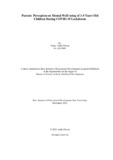| dc.contributor.advisor | Islam, Syeda Fareha Shaheeda | |
| dc.contributor.author | Nawar, Anika | |
| dc.date.accessioned | 2022-03-03T04:40:19Z | |
| dc.date.available | 2022-03-03T04:40:19Z | |
| dc.date.copyright | 2021 | |
| dc.date.issued | 2021-12 | |
| dc.identifier.other | ID 20155003 | |
| dc.identifier.uri | http://hdl.handle.net/10361/16383 | |
| dc.description | This thesis is submitted in partial fulfilment of the requirements for the degree of Masters of Science in Early Child Development, 2021. | en_US |
| dc.description | Cataloged from PDF version of thesis. | |
| dc.description | Includes bibliographical references (pages 61-68). | |
| dc.description.abstract | Due to the COVID-19 pandemic, children's mental well-being is being hampered. Mental well-being is essential for every stage of life. Child mental health is the absolute well-being and ideal development of a child in the emotional, behavioral, social, and cognitive domains. This lockdown impacts negatively children's mental health and welfare, resulting in a wide variety of mental health issues, such as stress, anxiety, depression, and so many other issues. Suddenly, parents had to handle their kids at home 24/7 for a long time. The study examined the parents’ perceptions and practices towards children's mental well-being during COVID-19 lockdowns as it may be helpful in children's development and well-being.
A qualitative study has been conducted with 18 parents. The data has been collected through In-Depth Interviews and Focus Group Discussions via online platform.
The research findings disclosed that parents do not have so clear idea about mental well-being. They faced problems in managing their children's mental well-being in the COVID-19 lockdown. Most of the children were facing emotional and behavioral problems due to the environment created by COVID-19 lockdown and children became device addicted as well. Therefore, children were affected by home confinement that increased their stress, fear, anxiety, stubbornness, and affected negatively on daily routine, activities and learning. Few parents were more aware of this overall situation, and they have been trying to maintain their children’s mental well-being, but unfortunately, they could not manage it properly. However, the rest of the parents could not do anything particularly due to different ways of thinking, family culture, and lifestyle. During this global pandemic, parents and other family members need to provide appropriate support to mitigate those developmental delays. | en_US |
| dc.description.statementofresponsibility | Anika Nawar | |
| dc.format.extent | 76 pages | |
| dc.language.iso | en | en_US |
| dc.publisher | Brac University | en_US |
| dc.rights | BRAC University thesis reports are protected by copyright. They may be viewed from this source for any purpose, but reproduction or distribution in any format is prohibited without written permission. | |
| dc.subject | Mental well-being | en_US |
| dc.subject | Children 3-5 years age | en_US |
| dc.subject | Lockdown | en_US |
| dc.subject | Covid-19 | en_US |
| dc.subject | Pandemic | en_US |
| dc.subject.lcsh | Child mental health | |
| dc.title | Parents' perception on mental well-being of 3-5 years old children during COVID-19 lockdowns | en_US |
| dc.type | Thesis | en_US |
| dc.contributor.department | Institute of Education Development, BRAC University | |
| dc.description.degree | M. Early Child Development | |

